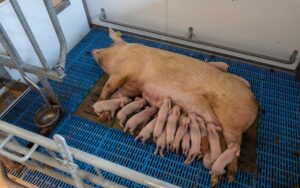Farming minister Daniel Zeichner has confirmed that the government is planning to bring forward proposals to reform farrowing systems in the UK.
But he stressed that the government recognises that farmers will need time and support to adapt to alternative systems – and said the government was ‘mindful’ of what happened after the 1999 sow stall ban.
The minister was speaking at the end of a debate on Tuesday on ‘cages and crates’ in farming, which was the direct result of a petition by Dame Joanna Lumley for Compassion in World Farming that gained 105,000 signatures.
Opening the debate, Labour Irene Cambell (North Ayrshire and Arran), said she recently hosted a drop-in event on farrowing crates in parliament, which ‘raised awareness of the conditions in which sows are kept on some British pig farms’.
She said farrowing crates were ‘barred, metal and often barren, and their cramped and unhygienic conditions can lead to disease and the overuse of antibiotics’.
“About 200,000 sows every year spend nearly a quarter of their lives in these farrowing stalls, which are so small that they cannot even turn around, nestle their piglets or express natural behaviours, such as rooting or nest-building,” she said.
She met with the NPA prior to the debate and welcomed the association’s position on the need to transition to flexible farrowing systems. But she said there must be scope for a shorter transition than the 20 years suggested.
The CIWF petition also included calls for a ban on all cages for laying hens, calf pens and cages for farmed, with plenty of MPs backing the petitions stance.
Timescale and cost
But the balanced debate also included contributions from MPs with a farming background, who were keen to give context, including Conservative Charlie Dewhirst (Bridlington and The Wolds), the former NPA policy adviser.

He explained that farrowing crates exist to protect piglets ‘for a limited period around the time that the sow gives birth’. He said the move to flexible farrowing systems is already underway, covering 8% of indoor production, around 5,000 places.
He highlighted the timescales and costs involved in the transition process for the remaining 55,000 or so sow places.
“A lot of the buildings will need to be rebuilt completely, which will require planning permission and vast cost. We need to work with farmers to ask what the realistic timescale is, so that we do not leave people high and dry or put them out of business. “We need to make sure that they have the resources and time to move to a better, higher welfare system.
“The petition wants a ban. If the industry continues to move in the right direction, a ban does not necessarily need to be implemented.”
He urged the government to heed the warning from history when ‘50% of the British pig industry went bust because those farms simply could not afford to transition’ away from sow stalls following the 1999 unilateral UK ban.
Clarity
Conservative shadow Defra minister Neil Hudson (Epping Forest), a former vet, noted that the British Veterinary Association has joined the NPA and Building Suppliers Forum in calling for the phasing out of farrowing crates over ‘at least’ a 15-year transition period. He also noted the ‘significant costs to replacing practices that would be banned’.
He called for clarity on how the government intend to approach this issue and urged it to work with industry to make sure reforms are ‘affordable, practical, effective and, at their heart, promote animal and bird welfare’.
Mr Hudson also urged the government to uphold animal welfare standards in trade deals and called for assurances that ‘no animal products will be imported to the UK where sow stalls have been used’.
Minister’s response
Concluding the debate, Mr Zeichner said the prime minister has committed to publishing an animal welfare strategy later this year, and he made it clear the government is developing proposals for reforms to farrowing systems, but insisted the industry’s needs would be taken into account.
“As the Government bring forward proposals, we will subject them to a full consultation,” he said. “We absolutely recognise that the industry will need time to adapt. Farrowing accommodation will need to be considerably adapted, and potentially rebuilt and extended to allow for a larger pen footprint, and that will clearly impose significant costs on the indoor pig sector.
“It will also require communities to recognise that the planning system will have to accommodate changes to allow better welfare, so we need to get specifications right. Training will also be essential for stockpeople to adapt to a brand-new system and ensure both human and pig welfare.”
He said there is ‘consensus that farrowing crates restrict a sow’s movement, preventing her from turning around and performing normal behaviours such as nest building’.
While NGOs like the RSPCA and CIWF have campaigned on the issue for a long time, he also welcomed the stance of the BVA and Pig Veterinary Society in calling for a ‘gradual phase-out of farrowing crates.
“The National Pig Association has recognised that the direction of travel is moving away from farrowing crates, and it has done a lot of work in that area. Indeed, some producers have already made a move towards alternative farrowing systems,” he said.
Discussing the cases for completely free farrowing systems and flexible systems, he said a significant part of the government’s consideration is ‘the evidence around sow and piglet welfare and stockperson welfare’.
Trade concerns
On concerns over trade, he added: “I am mindful of what happened in 1999 when the UK unilaterally banned sow stalls. Although it was the right thing to do in animal welfare terms, it did contribute to a reported 40% decline in the pig breeding herd in the following decade, sadly opening the door to more pig meat imports from countries still using sow stalls.
“It is therefore essential that we carefully evaluate the implications of potential cage and crate bans on trade. We need to carefully consider the potential for unintentionally replacing UK production with lower welfare production overseas.”
He noted that the European Commission is considering proposals to ban cages and crates and has said that the first legislative proposals will be announced in 2026, although the timescales are unclear.
“We are acutely aware of and concerned about imports produced using methods that are not permitted in the UK, and I can reassure the shadow Minister that we will use our trade strategy to promote the highest food production standards and protect farmers from being undercut by low welfare and low standards in trade deals,” he said.




